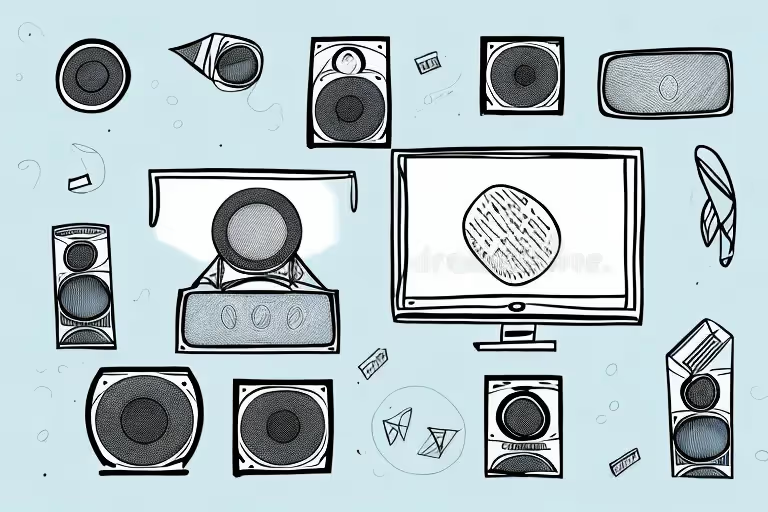In today's fast-paced and hectic world, finding moments of peace and calm is crucial for both our physical and mental well-being. Meditation has long been recognized as a powerful tool for relaxation and self-reflection, helping individuals find a sense of balance amid the chaos of modern life. Traditionally, meditation is practiced in a seated position, but have you ever wondered if it's possible to meditate lying down? In this article, we will delve into the benefits and challenges of lying down meditation, and explore how this practice can enhance your overall meditation experience.
Understanding the Basics of Meditation
Before we delve into lying down meditation, it's important to have a solid understanding of the basics of meditation. At its core, meditation is a practice that involves focusing the mind and achieving a state of mental clarity and inner peace. Through various techniques such as mindful breathing, visualization, and body scanning, meditation allows us to let go of thoughts and distractions, promoting a sense of calm and self-awareness.
But what exactly is meditation? Meditation can take many forms, from seated meditation to walking meditation and everything in between. The primary goal of meditation is to cultivate mindfulness and presence, enabling us to connect with our inner selves and the present moment.
Aura has the world’s largest and best collection of Meditations and hundreds of Coaches to choose from.
Try it Free!
Defining Meditation
Meditation is a centuries-old practice that has been embraced by various cultures and religions around the world. It is not limited to any specific belief system or ideology. Instead, it is a universal practice that can be adapted to suit individual preferences and needs.
One of the key aspects of meditation is the cultivation of mindfulness. Mindfulness is the ability to be fully present in the moment, without judgment or attachment to thoughts, emotions, or sensations. It is about observing and accepting whatever arises, whether it is a pleasant or unpleasant experience.
Through meditation, we learn to train our minds to become more aware of our thoughts and emotions, allowing us to respond to them in a more skillful and compassionate way. It helps us develop a deeper understanding of ourselves and the world around us.
Common Misconceptions about Meditation
Before we move on to lying down meditation, let's address some common misconceptions about meditation. Many people mistakenly believe that meditation requires complete stillness and an empty mind. However, meditation is a practice that embraces our thoughts and sensations, allowing them to arise and pass without judgment. It's not about silencing the mind, but rather observing and accepting whatever arises.
Another misconception is that meditation is only for spiritual or religious purposes. While meditation has roots in various spiritual traditions, it is not limited to any particular belief system. It can be practiced by anyone, regardless of their religious or spiritual background.
Furthermore, meditation is often seen as a solitary practice, but it can also be done in a group setting. Group meditation can provide a sense of community and support, as well as an opportunity to learn from others' experiences.
Additionally, some people may think that meditation is a quick fix for all their problems. While meditation can have numerous benefits for mental, emotional, and physical well-being, it is not a magical solution that will instantly solve all of life's challenges. It requires consistent practice and patience to experience its full benefits.
Overall, understanding these common misconceptions can help us approach meditation with an open mind and a willingness to explore its potential. Now that we have a clearer understanding of the basics of meditation, let's explore lying down meditation and its benefits.
The Art of Lying Down Meditation
Now, let's dive into the world of lying down meditation. As the name suggests, lying down meditation involves assuming a supine position while engaging in the practice of meditation. This variation allows for deep relaxation and can be particularly beneficial for those who struggle with physical discomfort or limitations in seated positions.
When it comes to meditation, there are various techniques and postures that can be explored. Lying down meditation offers a unique approach, providing a different perspective and experience compared to traditional seated meditation. By lying down, you are able to fully surrender your body to the ground, allowing for a deeper sense of letting go and relaxation.
What is Lying Down Meditation?
Lying down meditation involves finding a comfortable position on your back, with your arms and legs uncrossed. It's important to maintain a sense of wakefulness, so finding the right balance of relaxation and alertness is key. You can use a cushion or pillow to support your head and neck, and props such as blankets or bolsters to ensure maximum comfort.
One of the advantages of lying down meditation is that it can be practiced anywhere, whether it's on a yoga mat, a comfortable bed, or even on a beach towel under the warm sun. The flexibility of this posture allows for a wide range of possibilities, making it accessible to individuals of all ages and physical abilities.
As you settle into your lying down position, take a moment to notice the support of the ground beneath you. Feel the gentle pressure against your back, allowing yourself to fully surrender into this support. Close your eyes if it feels comfortable, or soften your gaze towards a fixed point in the room.
How to Practice Lying Down Meditation
When practicing lying down meditation, it's important to remain focused and present. Begin by bringing your attention to your breath, feeling the natural rhythm of inhaling and exhaling. As thoughts arise, acknowledge them without judgment, and gently guide your focus back to your breath.
As you continue to breathe, you may notice sensations in your body. Perhaps there is tension in your shoulders or tightness in your lower back. Take this opportunity to explore body scanning techniques, where you bring your awareness to each part of your body and release tension as you exhale.
Start from the top of your head and slowly move down, noticing any areas of discomfort or tightness. With each exhale, imagine the tension melting away, allowing your body to sink deeper into relaxation. This practice not only helps release physical tension but also cultivates a deeper connection between your mind and body.
During lying down meditation, it's common for the mind to wander. Thoughts may arise, distracting you from the present moment. Instead of getting caught up in these thoughts, gently redirect your attention back to your breath or the sensations in your body. Remember, the goal is not to eliminate thoughts but rather to observe them without attachment.
As you continue with your lying down meditation practice, you may find that your body naturally relaxes even further. Your breath may become slower and more rhythmic, and a sense of calmness may wash over you. Embrace this state of deep relaxation and allow yourself to fully immerse in the present moment.
Remember, lying down meditation is a practice that requires patience and consistency. Just like any form of meditation, it takes time to cultivate a sense of stillness and inner peace. Be gentle with yourself and trust in the process. With regular practice, lying down meditation can become a powerful tool for relaxation, self-discovery, and overall well-being.
Benefits of Lying Down Meditation
Now that we understand the basics of lying down meditation, let's explore the benefits it can bring to our overall well-being.
Physical Benefits
Lying down meditation allows for deep relaxation, promoting physical release and rejuvenation. It can help alleviate tension in the body, reduce muscle soreness, and improve overall sleep quality. By lying down, we allow our muscles and joints to fully relax, enabling the body to enter a state of profound rest and repair.
Mental and Emotional Benefits
Lying down meditation offers a unique opportunity to cultivate a deep sense of inner peace and tranquility. By surrendering to gravity and releasing physical tension, we create space for emotional healing and mental clarity. This practice encourages self-compassion and allows us to connect with our emotions, fostering a greater sense of self-awareness and emotional well-being.
Challenges in Lying Down Meditation
While lying down meditation has its benefits, it also presents some challenges that practitioners may encounter along their meditation journey.
Potential Distractions and How to Overcome Them
One of the main challenges of lying down meditation is the potential for increased distractions. When lying down, it's easier for the mind to wander off or for drowsiness to set in. To overcome this, it's essential to maintain a sense of wakefulness and engagement. Experiment with different techniques such as counting breaths or using guided meditation apps to stay focused and present.
Physical Discomfort and Solutions
Another challenge of lying down meditation is the possibility of physical discomfort, especially for individuals with back or neck issues. If discomfort arises, try adjusting your position or using additional props for support. You can also consider incorporating stretching or gentle yoga poses before your meditation session to prepare your body for lying down.
Comparing Lying Down Meditation to Other Forms
Lastly, let's compare lying down meditation to other forms of meditation to understand its unique qualities and benefits.
Lying Down vs Sitting Meditation
Both lying down and sitting meditation have their advantages and suit different individuals and situations. Lying down meditation offers a deeper sense of relaxation and can be beneficial for individuals who struggle with physical discomfort. On the other hand, sitting meditation promotes greater alertness and mental focus. It's essential to experiment with both forms and find what works best for you.
Lying Down vs Walking Meditation
Similar to sitting meditation, walking meditation offers a different approach to mindfulness. While lying down meditation allows for deep relaxation, walking meditation combines gentle movement with meditative awareness. Walking meditation can be particularly beneficial for individuals who find it challenging to sit or lie down for an extended period.
On the other hand, don't forget that exploring different forms of meditation is a personal journey. What matters most is finding a practice that resonates with you and integrating it into your daily routine. Embrace the beauty of self-discovery and allow yourself to grow through your meditation practice.
In conclusion, lying down meditation is a valid and effective form of practice that offers unique benefits. By allowing ourselves to release physical tension and surrender to relaxation, we can deepen our meditation experience and foster overall well-being.
If you're interested in incorporating lying down meditation into your routine or exploring other meditation techniques, the Aura Health app can be a valuable resource. With its diverse range of guided meditations and customizable sessions, Aura Health can support you on your meditation journey. Start your meditation practice today and unlock the potential for inner peace and self-discovery.
Aura is Your All In One App for Meditation, Mindfulness Wellbeing
Find peace every day with one app for your whole well-being. There is no one-size-fits-all solution to mental well-being. Aura is the first all-in-one wellness app that learns how to best help you. Discover an endless library of expert-created tracks for your well-being, all taught by the world’s best coaches, therapists, and storytellers. With Aura's personalized recommendations, you can find peace every morning, day and night.



.webp)






.avif)

%20(1).avif)


.avif)
.avif)
.webp)


.avif)


















































































































.avif)

















.svg)









